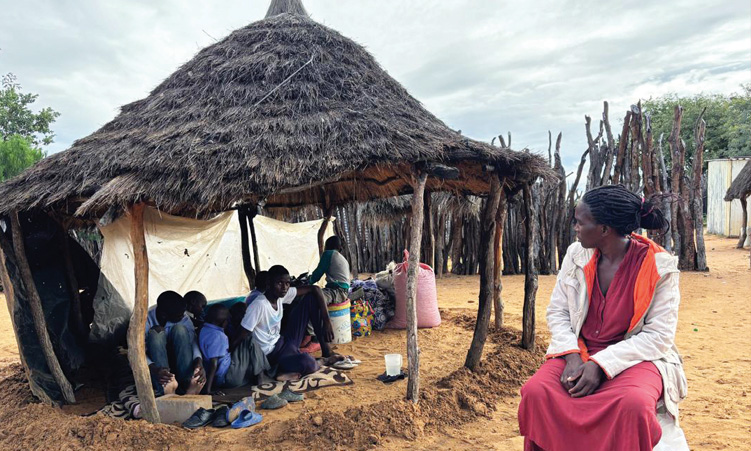… mother of seven struggles to survive after protection order
Johanna Nangombe (42) and her seven children are homeless, hungry, and struggling to stay dry as rain pours over their traditional hut.
After living in their home at Ombondeyomutsegondjamba village in the Omusati region for the past 15 years, Nangombe and her children were forced out when her husband obtained an interim protection order against her.
Now, they are living in desperate conditions, sheltered only by an open traditional hut covered with three old plastic sheets on one side.
Their only mattress lies on the ground without a groundsheet, where it soaks up rainwater.
Some of the children sleep in another hut, held together only by two Y-shaped poles to keep it from collapsing.
This hut is flooded with rainwater, soaking the small tent the children put up inside it.
This temporary refuge is in village secretary Ester Senalye’s yard in the Ruacana constituency.
Nangombe says she never expected to be thrown out of her home, especially not with young children.
“We have nowhere else to go. The rain keeps coming, and we have nothing to eat,” she says.
BARRED FROM GOING HOME
Nangombe’s ordeal began on 22 January when her husband, Salvadole Fabianus (56), obtained an interim protection order against her.
She says police officers from Oshifo Police Station, accompanied by her husband, served her with the order which barred her from returning to their matrimonial home without informing the police.
If she violates the order’s conditions, she will be fined N$8 000, she says.
“We left the house that night and my husband said he wanted to stay in the house. He is not in the house as we speak, he went back to Angola that very same day. He said he wants to sell the house,” she says.
Nangombe says she left many of her belongings at the house, including food, a chicken, pigs, goats and dogs.
“Now, my children told me the chicken and dogs have died of hunger and thirst while nine goats are missing,” she says.
Their crops, meant to sustain them this year, have been destroyed by animals, she says.
Nangombe and Fabianus have four children between the ages of eight and 15, and she also cares for three schoolgoing relatives.
“He [Fabianus] confirmed at a family meeting at Okalongo that he has two houses in Angola, with a wife and six children at each house.
He does not give our children anything,” she says.
BROKEN MARRIAGE
When The Namibian visited the house last Tuesday, Nangombe and the children did not have enough food, apart from a bit of flour at the bottom of a 20-litre container.
She claims their marriage fell apart in 2016 when Fabianus left for Angola “to look for better grazing”.
“He left me in the house with my children in 2016. I was pregnant at the time. He has had a house there because we would stay there before I forced him to move back to Namibia.
“We left a lady who was looking after the house. He ended up impregnating her and making her his wife,” she says.
“Before leaving, he took all the livestock to Angola, including 32 goats that belonged to me. He said he did not want them to die from drought.”
In 2017, desperate to see her husband and goats, Nangombe says she decided to travel to Angola, where she was met by Fabianus’ new wife.
“She told me most of the goats had already been sold,” she says.
“When he returned to Namibia in 2018, he asked me what I was looking for at his house.
He then warned me never to set foot in his Angolan home again. He said if I dared go there, he would kill me,” Nangombe says.
Since then, Fabianus has visited their home only four times in eight years, she says.
She claims he is verbally and physically abusive.
“I reported the abuse to the police at Oshifo, but they referred me to the Uukolonkadhi Traditional Authority,” she says.
Before their wedding in 2008, she says Fabianus had repeatedly asked her parents for permission to take her to Angola to work in his shebeen.
“He came to our house three times. The first two times, my parents refused. On the third time, they agreed.”
‘SUSPICIOUS BEHAVIOUR’
Fabianus was not reachable for comment yesterday, but according to his affidavit attached to the protection order, he denies ever being married to Nangombe.
Despite this, he refers to her as “my wife”.
He claims he left their home in 2019 and could not return to Namibia due to Covid-19 lockdowns, although lockdowns for all entry points were only introduced in Namibia in June 2020.
Upon his return in 2022, he says he found some of his goats were missing.
“When I tried to ask her, she always became arrogant. I started getting worried about her suspicious behaviour,” the affidavit states.
Fabianus also alleges that Nangombe’s family summoned him for a meeting at Okalongo, where she told him in front of her family and the village headman that she was tired of him and his “bad behaviour”.
“From there, I decided not to go home because she was angry,” he says.
He further claims he discovered that his wife had moved their home without his permission in 2023.
‘ANOTHER MAN’
“One of my sons told me my wife had found another man,” he says.
Then, in December last year, Fabianus says he witnessed a man entering their home, whom he suspected to be Nangombe’s lover.
Nangombe, however, denies this.
Village secretary Senalye says Fabianus left the village in 2016.
She also accuses him of abusing his wife and appeals to good Samaritans to donate food to Nangombe and her children.
“I am unable to feed them for long, as I already have 13 people in my house,” she says.
Senalye says Nangombe suffers from insomnia and hunger.
“When she was evicted from her house, her husband told her to sleep in the bushes. That’s when my husband and I decided to take them in temporarily,” she says.
She cites examples of Fabianus’ alleged abuse.
“There was a time he beat Johanna while she was heavily pregnant, and she gave birth to a premature baby.
The baby spent months in an incubator, but luckily survived. He also beat her while forcing her to plow with oxen,” she says.
The children this week confirmed they had been primarily cared for by their mother for the past eight years.
Stay informed with The Namibian – your source for credible journalism. Get in-depth reporting and opinions for
only N$85 a month. Invest in journalism, invest in democracy –
Subscribe Now!










